2018年高考英语语法大全(绝对精品)
2018年江苏高考英语重点语法知识讲解(易错点)
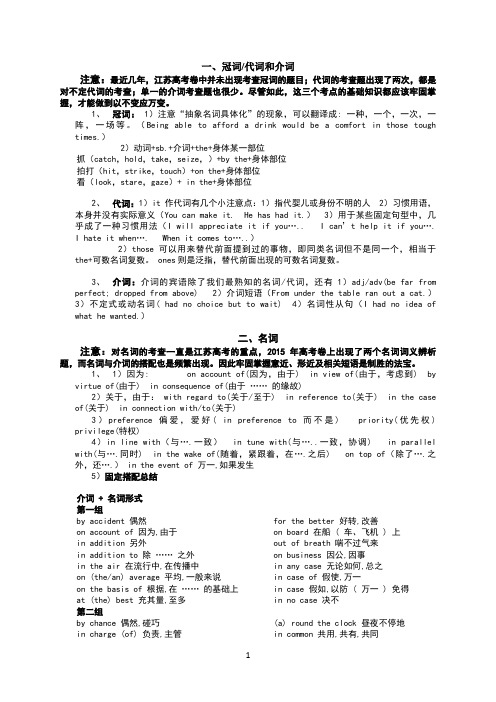
一、冠词/代词和介词注意:最近几年,江苏高考卷中并未出现考查冠词的题目;代词的考查题出现了两次,都是对不定代词的考查;单一的介词考查题也很少。
尽管如此,这三个考点的基础知识都应该牢固掌握,才能做到以不变应万变。
1、冠词: 1)注意“抽象名词具体化”的现象,可以翻译成: 一种,一个,一次,一阵,一场等。
(Being able to afford a drink would be a comfort in those tough times.)2)动词+sb.+介词+the+身体某一部位抓(catch,hold,take,seize,)+by the+身体部位拍打(hit,strike,touch)+on the+身体部位看(look,stare,gaze)+ in the+身体部位2、代词:1)it作代词有几个小注意点:1)指代婴儿或身份不明的人 2)习惯用语,本身并没有实际意义(You can make it. He has had it.) 3)用于某些固定句型中,几乎成了一种习惯用法(I will appreciate it if you….. I can’t help it if you….I hate it when…. When it comes to…..)2)those可以用来替代前面提到过的事物,即同类名词但不是同一个,相当于the+可数名词复数。
ones则是泛指,替代前面出现的可数名词复数。
3、介词:介词的宾语除了我们最熟知的名词/代词,还有1)adj/adv(be far fromperfect; dropped from above) 2)介词短语(From under the table ran out a cat.)3)不定式或动名词( had no choice but to wait) 4)名词性从句(I had no idea of what he wanted.)二、名词注意:对名词的考查一直是江苏高考的重点,2015年高考卷上出现了两个名词词义辨析题,而名词与介词的搭配也是频繁出现。
2018高考英语最基础的语法知识点总结

2018高考英语最基础的语法知识点总结 2018高考英语最基础的语法知识点总结在高考英语中往往会出一些最基础的语法题,这就需要我们知道并掌握高考英语最基础的语法知识点,下面为大家整理一下,供参考! 高考英语最基础的重点语法知识点1)多个形容词修饰名词的排列顺序限定词(包括冠词、所有格、人称代词、指示代词、数量词等)+表示观点的词(品质,状态,即表示好坏美丑等的词)+大小或长短+年龄或新旧+形状或样式+颜色+产地或来源+材料或种类+用途+名词a nice long new black British plastic pen2)形容词作状语,表伴随或结果 He returned,safe but tired.3)复合形容词语法的用法1)副词 + 过去分词 hard-won得来不易的,newly-made新建的2)名词 + 形容词 life-long终生的,world-famous世界闻名的3)名词 + 现在分词 peace-loving爱好和平的,fun-loving爱开玩笑的4)形容词 + 现在分词 good-looking好看的,easy-going随和的5)副词 + 现在分词 hard-working勤劳的,fast-moving快速转动的高考英语基础的形容词和副词比较级和最高级相关语法二、(1)表达倍数语法的常用结构1.数词+times+as+形容词原级+asThis room is twice as big as that one.这房间的面积是那间的两倍。
2.数词+times+形容词比较级+thanThis room is twice bigger than that one.这房间的面积是那间的两倍。
(2)高考英语比较级和最高级语法的常见结构―the +比较级, the +比较级―:表示―越越 The sooner you see a doctor, the better it is.你越早看医生越好。
2018年江苏高考英语重点语法知识讲解(易错点)
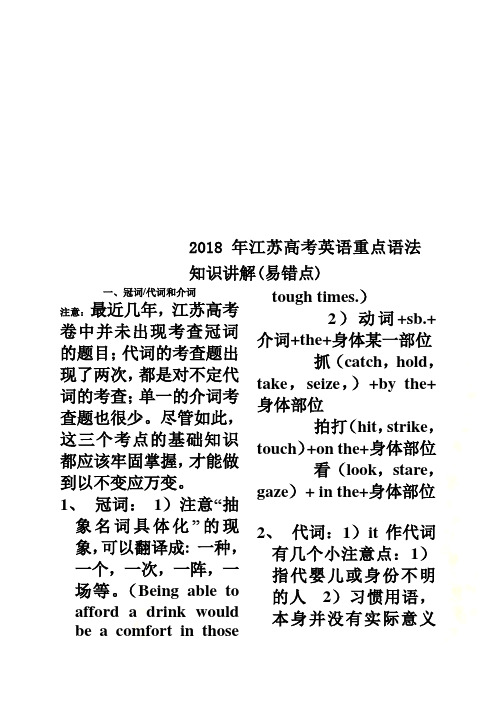
2018年江苏高考英语重点语法知识讲解(易错点)一、冠词/代词和介词注意:最近几年,江苏高考卷中并未出现考查冠词的题目;代词的考查题出现了两次,都是对不定代词的考查;单一的介词考查题也很少。
尽管如此,这三个考点的基础知识都应该牢固掌握,才能做到以不变应万变。
1、冠词:1)注意“抽象名词具体化”的现象,可以翻译成: 一种,一个,一次,一阵,一场等。
(Being able to afford a drink would be a comfort in thosetough times.)2)动词+sb.+介词+the+身体某一部位抓(catch,hold,take,seize,)+by the+身体部位拍打(hit,strike,touch)+on the+身体部位看(look,stare,gaze)+ in the+身体部位2、代词:1)it作代词有几个小注意点:1)指代婴儿或身份不明的人2)习惯用语,本身并没有实际意义(You can make it. He has had it.)3)用于某些固定句型中,几乎成了一种习惯用法(I will appreciate it if you….. I can’t help it if you…. I hate it when…. When it comes to…..)2)those可以用来替代前面提到过的事物,即同类名词但不是同一个,相当于the+可数名词复数。
ones 则是泛指,替代前面出现的可数名词复数。
3、介词:介词的宾语除了我们最熟知的名词/代词,还有1)adj/adv(be far from perfect; dropped from above) 2)介词短语(From under the table ran out a cat.)3)不定式或动名词( had no choice but towait) 4)名词性从句(I had no idea of what he wanted.)二、名词注意:对名词的考查一直是江苏高考的重点,2015年高考卷上出现了两个名词词义辨析题,而名词与介词的搭配也是频繁出现。
(共10套285页)2018年高考语法真题分类汇总 (含所有高考考点)
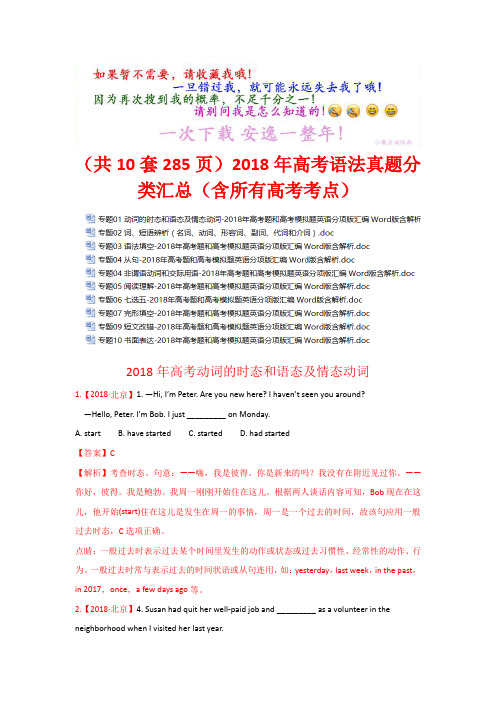
(共10套285页)2018年高考语法真题分类汇总(含所有高考考点)2018年高考动词的时态和语态及情态动词1.【2018·北京】1. —Hi, I’m Peter. Are you new here? I haven’t seen you around?—Hello, Peter. I’m Bob. I just _________ on Monday.A. startB. have startedC. startedD. had started【答案】C【解析】考查时态。
句意:——嗨,我是彼得。
你是新来的吗?我没有在附近见过你。
——你好,彼得。
我是鲍勃。
我周一刚刚开始住在这儿。
根据两人谈话内容可知,Bob现在在这儿,他开始(start)住在这儿是发生在周一的事情,周一是一个过去的时间,故该句应用一般过去时态,C选项正确。
点睛:一般过去时表示过去某个时间里发生的动作或状态或过去习惯性、经常性的动作、行为。
一般过去时常与表示过去的时间状语或从句连用,如:yesterday,last week,in the past,in 2017,once,a few days ago等。
2.【2018·北京】4. Susan had quit her well-paid job and _________ as a volunteer in the neighborhood when I visited her last year.A. is workingB. was workingC. has workedD. had worked【答案】B点睛:过去进行时表示在过去某一时间段或某一段时间内正在发生或进行的动作或状态。
3.【2018·北京】7. China’s high-speed railways _________ from 9,000 to 25,000 kilometers in the past few years.A. are growingB. have grownC. will growD. had grown【答案】B【解析】考查时态。
2018高中英语语法大全归纳总结

高中英语语法权威解析目录:第01章名词性从句第02章“It”用法及其句型和固定搭配讲解第03章高中英语语法中的省略现象第04章主谓一致第05章动词不定式第06章倒装结构第07章定语从句第08章被动语态第09章祈使句第10章感叹句第11章疑问句第12章名词第一章名词性从句在句子中起名词作用的句子叫名词性从句(Noun Clauses)。
名词性从句的功能相当于名词词组, 它在复合句中能担任主语、宾语、表语、同位语、介词宾语等,因此根据它在句中不同的语法功能,名词从句又可分别称为主语从句、宾语从句、表语从句和同位语从句。
一.主语从句主语从句是在复合句中充当主语的从句,通常放在主句谓语动词之前或由形式主语it 代替,而本身放在句子末尾。
1. It 作形式主语和it引导强调句的比较It 作形式主语代替主语从句,主要是为了平衡句子结构,主语从句的连接词没有变化。
而it引导的强调句则是对句子某一部分进行强调,无论强调的是什么成分,都可用连词that。
被强调部分指人时也可用who/whom。
例如:a) It is a pity that you didn’t go to see the film. 你不去看那场电影真可惜。
b) It doesn’t interest me whether you succeed or not.我对你成功与否不感兴趣。
c) It is in the morning that the murder took place.谋杀案是在早上发生的。
(强调句型)d) It is John that broke the window.是John打碎的窗户。
(强调句型)2. 用it 作形式主语的结构(1) It is +名词+从句It is a fact that …事实是…It is an honor that …非常荣幸It is common knowledge that …是常识(2) It is +形容词+从句It is natural that…很自然…It is strange that…奇怪的是…(3) It is +不及物动词+从句It seems that…似乎…It happened that…碰巧…It appears that…似乎…(4) It +过去分词+从句It is reported that…据报道…It has been proved that…已证实…It is said that…据说…3. 主语从句不可位于句首的五种情况:(1)if 引导的主语从句不可居于复合句句首。
2018年江苏高考英语重点语法知识讲解(易错点)

一、冠词/代词和介词注意:最近几年,江苏高考卷中并未出现考查冠词的题目;代词的考查题出现了两次,都是对不定代词的考查;单一的介词考查题也很少。
尽管如此,这三个考点的基础知识都应该牢固掌握,才能做到以不变应万变。
1、冠词:1)注意“抽象名词具体化”的现象,可以翻译成:一种,一个,一次,一阵,一场等。
(Beingabletoaffordadrinkwouldbeacomfortinthosetoughtimes.)2)动词+sb.+介词+the+身体某一部位抓(catch,hold,take,seize,)+bythe+身体部位拍打(hit,strike,touch)+onthe+身体部位看(look,stare,gaze)+inthe+身体部位2、代词:1)it作代词有几个小注意点:1)指代婴儿或身份不明的人2)习惯用语,本身并没有实际意义(.)3)用于某些固定句型中,几乎成了一种习惯用法(Iwillappreciateitifyou…..Ican’thelpitifyou….Ihateitwhen….Whenitcomesto…..)2)those可以用来替代前面提到过的事物,即同类名词但不是同一个,相当于the+可数名词复数。
ones则是泛指,替代前面出现的可数名词复数。
3、介词:介词的宾语除了我们最熟知的名词/代词,还有1)adj/adv(befarfromperfect;droppedfromabove)2)介词短语(Fromunderthetableranoutacat.)3)不定式或动名词(hadnochoicebuttowait)4)名词性从句(Ihadnoideaofwhathewanted.)二、名词注意:对名词的考查一直是江苏高考的重点,2015年高考卷上出现了两个名词词义辨析题,而名词与介词的搭配也是频繁出现。
因此牢固掌握意近、形近及相关短语是制胜的法宝。
1、1)因为:onaccountof(因为,由于)inviewof(由于,考虑到)byvirtueof(由于)inconsequenceof(由于……的缘故)2)关于,由于:withregardto(关于/至于)inreferenceto(关于)inthecaseof(关于)inconnectionwith/to(关于)3)preference偏爱,爱好(inpreferenceto而不是)priority(优先权)privilege(特权)4)inlinewith(与….一致)intunewith(与…..一致,协调)inparallelwith(与….同时)inthewakeof(随着,紧跟着,在….之后)ontopof(除了….之外,还….)intheeventof万一,如果发生5)固定搭配总结介词+名词形式第一组byaccident偶然onaccountof因为,由于inaddition另外inadditionto除……之外intheair在流行中,在传播中on(the/an)average平均,一般来说onthebasisof根据,在……的基础上at(the)best充其量,至多forthebetter好转,改善onboard在船(车、飞机)上outofbreath喘不过气来onbusiness因公,因事inanycase无论如何,总之incaseof假使,万一incase假如,以防(万一)免得innocase决不第二组bychance偶然,碰巧incharge(of)负责,主管(a)roundtheclock昼夜不停地incommon共用,共有,共同inconclusion最后,总之onconditionthat在……条件下inconfidence信任inconnectionwith/to关于inconsequence因此,结果inconsequenceof由于……的缘故onthecontrary反之,正相反incontrastwith/to与……成对照outofcontrol失去控制undercontrol被控制住atallcosts不惜任何代价atthecostof以……为代价第三组inthecourseof在……过程中,在……期间ofcourse当然,自然,无疑indanger在危险中,垂危outofdanger脱离危险outofdate过期(时)的uptodate时新的indebt欠债indetail详细地indifficulties处境困难inthedistance在远处offduty下班onduty值班,上班onearth究竟,到底atallevents无论如何inanyevent无论如何ineffect有效;实际上第四组intheeventof万一,如果发生forexample例如withtheexceptionof除……之外inthefaceof面对,不顾,即使infact其实,实际上onfire烧着onfoot步行inforce有效;实施中infavo(u)rof有利于,赞成,支持infrontof在……面前in(the)future今后,将来onguard警惕,防范ingeneral通常,大体上inhalf成两半athand在手边,在附近fromtiptotoe彻头彻尾,完全byhand用手handdownto往下传,传给(后代)第五组handinhand手拉手,携手inhand在掌握中,在控制中onhand在手边,临近on(the)onehand...一方面……, ontheotherhand...另一方面……atheart在内心;实质上byheart牢记,凭记忆athome在家,在国内;自在,自如inhonorof以纪念,向……表示敬意onone'shonor以名誉担保inahurry匆忙地,立即forinstance例如,举例说atintervals不时,时时atlast最终,终于atleast至少,最低限度intheleast一点,丝毫第六组atlength终于,最后;详细地inthelightof按照,根据inline成一直线,排成一行inlinewith与……一致,按照ataloss困惑,不知所措asamatteroffact其实,事实上byallmeans无论如何,必定bymeansof借助于,用bynomeans决不inmemoryof纪念atthemercyof在……支配下bymistake错误地atthemoment现在,此刻foramoment片刻,一会儿forthemoment现在,暂时inamoment立刻,马上第七组innature本质上onoccasion有时,不时inorder秩序井然,整齐ingroupto以便,为了ingroupthat以便outoforder发生故障,失调onone'sown独自地,独立地inparticular特别地,尤其,详细地inthepast在过去,以往inperson亲自inplace在适当的位置inplaceof代替inthefirstplace起初,首先inthelastplace最后outofplace不得其所的,不适当的onthepoint即将……的时候第八组tothepoint切中要害,切题inpractice在实际中,实际上outofpractice久不练习,荒疏atpresent目前,现在forthepresent目前,暂时inproportionto(与……)成比例的inpublic公开地,当众for(the)purposeof为了onpurpose故意,有意withthepurposeof为了inquestion正在考虑atrandom随意地,任意地atanyrate无论如何,至少byreasonof由于asregards关于,至于with/inregardto对于,就……而论第九组in/withrelationto关系到withrespectto关于asaresult结果,因此asaresultof由于……的结果inreturn作为报答,作为回报ontheroad在旅途中asarule规章,规则;通常,照例inthelongrun最终,从长远观点看forthesakeof为了……起见onsale出售;贱卖onalargescale大规模地onasmallscale小规模地insecret秘密地,私下地inasense从某种意义上说inshape处于良好状态ontheside作为兼职,额外第十组atfirstsight乍一看,初看起来insight被看到,在望outofsight看不见,在视野之外inspiteof不管,不顾;尽管,虽然onthespot当场,在现场instep同步,合拍outofstep步调不一致,不协调instock现有,备有insum总而言之intears流着泪,含泪,哭intermsof依据,按照;用……措词foronething首先,一则onthesecondthoughts经重新考虑,一转念atatime每次,一次atnotime从不,决不atonetime同时,曾经,从前曾第十一组atthesametime但是,然而attimes有时forthetimebeing目前,暂时fromtimetotime有时,不时innotime立即,马上intime及时,适时地ontime准时ontopof在……之上outoftouch失去联系intruth事实上,实际上,的确ontry试穿byturns轮流,交替地inturn依次,轮流invain徒劳,无效avarietyof种种,各种byvirtueof由于第十二组bytheway顺便提一下,另外bywayof经由,通过……方式inaway在某点,在某种程度上innoway决不inthewayof妨碍inone's/theway妨碍,阻碍afterawhile过了一会,不久forawhile暂时,一时onthewhole总的来说inaword总而言之inotherwords换句话说,也就是说atwork在工作,忙于outofwork失业intheworld到底,究竟动词+名词形式第十三组have/gainaccessto可以获得take...intoaccount考虑gain/haveanadvantageover胜过,优于paythewayfor为……铺平道路takeadvantageof利用,趁……之机payattentionto注意do/tryone'sbest尽力,努力getthebestof胜过makethebestof充分利用,妥善处理getthebetterof打败,致胜catchone'sbreath屏息,歇口气takecare小心,当心takecareof照顾,照料takeachance冒险一试takechargeof担任,负责keepcompanywith与……交往,与……takedelightin以……为乐withdelight欣然,乐意地第十四组makea/thedifference有影响,很重要carry/bringintoeffect使生效,使起作用putintoeffect实行,生效come/gointoeffect生效,实施takeeffect生效,起作用catchone'seye引人注目keepaneyeon留意,照看makeaface做鬼脸findfault埋怨,挑剔catchfire着火come/gointoforce生效,实施makefriends交朋友,友好相处befriendswith对……友好,与……交上朋友makefunof取笑,嘲弄keepone'shead保持镇静lostone'shead不知所措第十五组loseheart丧失勇气,失去信心get/learnbyheart记住,背诵getholdof抓住,掌握keephouse管理家务,做家务throw/castlighton使明白,阐明bear/keepinmind记住haveinmind记住,考虑到,想到makeupone'smind下决心come/gointooperation使投入生产,使运转putinorder整理,检修keep/holdpacewith跟上,与……同步playapart起作用takeplace发生,进行taketheplaceof代替cometothepoint说到要点,扼要地说bring/carryintopractice实施,实行第十六组makeprogress进步,进展giveriseto引起,使发生makesense讲得通,有意义catchthesightof发现,突然看见(go)onthestage当演员takeone'stime不急不忙,从容进行keepintouch保持联系keeptrack通晓事态,注意动向losetrack失去联系makeuseof利用puttouse使用,利用giveway让路,让步leadtheway带路,引路makeone'sway前进,进行makeway让路,开路keepone'sword遵守诺言第十七组acton作用appealto呼吁,要求attemptat企图,努力attitudeto/towards态度,看法agreat/gooddealof大量(的),许多(的) influenceon影响interferencein干涉interferencewith妨碍,打扰introduceto介绍alot(of)许多(的),大量(的) lotsof大量,很多fallinlovewith相爱,爱上amatterof(关于……)的问题anumberof若干,许多replyto回答,答复aseriesof一系列,一连串英语常考词语固定搭配(四)第十九组trolleybus电车身份证creditcard信用卡nodoubt无疑,必定nextdoor隔壁outofdoors在户外facetoface面对面地asmatteroffact实际情况,真相afew有些,几个quiteafew还不少,有相当数目的alittle一点,稍微,一些,少许littlebylittle逐渐地quitealittle相当多,不少nomatter无论themoment(that)一……就nomore不再第二十组fairplay公平竞赛;公平对待indemand有需要,销路好restroom厕所,盥洗室primaryschool小学sidebyside肩并肩,一个挨一个heartandsoul全心全意stepbystep逐步aheadoftime提前allthetime一直,始终onceuponatime从前onceinawhile偶尔,有时nowonder难怪,怪不得wordforword逐字地declinewiththanks婉言谢绝动词+介词形式第二十一组accountfor说明(原因等) aimat瞄准,针对allowfor考虑到appealto呼吁,要求arriveat达成,得出askafter询问,问候askfor请求,要求attachto附属于,隶属于beginwith从开始breakinto闯入breakoff断绝,结束breakthrough突破breakup中止,结束;打碎,折断bringabout带来,造成bringdown打倒,挫伤;降低bringforth产生,提上第二十二组bringforward提出bringout使出现;公布;出版bringup教育,培养,使成长buildup积累;堵塞;树立,逐步建立;增进;锻炼callfor邀请;要求;需求callforth唤起,引起;振作起,鼓起calloff放弃,取消catchat抓住(东西)callon/upon访问,拜访;号召,呼吁callup召集,动员;打电话carefor照管,关心;喜欢,意欲carryoff夺去carryon继续下去;从事,经营carryout贯彻,执行;实现cometo总计,达到;苏醒,复原counton依靠;期待,指望countup把……相加第二十三组coverup掩饰,掩盖cutacross走捷径,抄近路dealwith处理,对付,安排dowithout没有……也行fillin/out填充,填写getat得到,接近;意思是getinto进入,陷入goafter追求gointo进入;研究,调查gofor竭力想取得;喜爱;支持,拥护gothrough经历,经受;详细检查gowith伴随,与……协调gowithout没有……也行improveon改进keepto保持,坚持liein在于liveupto不辜负第二十四组liveon/by靠……生活,以……为食livethrough度过,经受过lookafter照管,照料lookat看望,注视lookfor寻找,寻求lookinto调查,观察,过问;窥视lookover检查,查看,调查lookthrough仔细查看,浏览,温习makefor走向,驶向;有助于occurto被想到,被想起playwith以……为消遣,玩弄referto参考,查阅,涉及,提到runfor竞选runinto撞上,偶然碰见seeto注意,负责,照料,修理sendfor派人去请,召唤;索取第二十五组sendin呈报,递交,送来serveas作为,用作setaside挑出,拨出,留出;拒绝sitfor参加standby支持,帮助;袖手旁观standfor代替,代表,意味着standagainst反抗,抵抗stickto坚持,忠于,信守takeafter与……相像takefor把……认为是,把……看成是takein接受,吸收;了解,理解taketo喜欢,亲近touchon关系到,涉及turninto变成turnto变成;求助于,借助于turnoff关上;出产;解雇动词+副词形式第二十六组breakdown损坏,分解,瓦解breakin闯入;打断,插嘴breakout逃出;突然发生,爆发bringto使恢复知觉burnout烧掉burnup烧起来,旺起来;烧完catchon理解,明白checkin办理登记手续checkout结账后离开;检验,核查checkup(on)校对,检查,检验cheerup使高兴,使振奋clearaway扫除,收拾clearup收拾;澄清;放晴makeitclearthat弄清楚comeoff实现,成功,奏效comeon请,来吧,快点;开始,出场,上演comeout出版;出现,显露;结果是第二十七组comeround(around)来访,前来;苏醒,复原comethrough经历,脱险comeup走近,上来;发生,被提出crossout删去,取消cutback削减,减少cutdown削减,降低cutin(汽车)抢道;插嘴,打断cutoff切断;删去;停止cutout删除cutshort突然停止diedown渐渐消失,平息dieout消失,灭绝drawin(火车、汽车)到站drawup写上,画上;草拟;停住dressup穿上盛装,打扮得很漂亮dropby/in顺便来访dryout干透,使干dryup干涸,枯竭第二十八组dropoff减弱,减少dropout退出,离队fallbehind落后fallout争吵;结果是fallthrough落空,失败feedin输入findout查明getacross解释清楚,使人了解getaround/round走动,旅行;(消息)传开getaway逃脱,离开getby通过,经过getdown从……下来;写下getin进入;收获,收集getoff从……下来;离开,动身,开始getover克服;(从病中)恢复过来getthrough结束,完成;接通电话havegotto(do)不得不,必须第二十九组gettogether集合,聚集getup起床;增加,增强giveaway泄露;分送giveback送还,恢复givein交上;投降,屈服giveoff放出,释放giveout分发,放出giveup停止,放弃goahead开始,前进;领先goby过去godown下降,降低;被载入,传下去gooff爆炸,发射;动身,离开goout外出;熄灭goover检查,审查;复习,重温goround/around足够分配gounder下沉,沉没;失败;破产gothrough通过,审查,完成第三十组goup上升,增加;建起handdown流传下来,传给,往下传handin交上,递交handon传下来,依次传递handout分发,散发,发给handover交出,移交,让与hangabout闲荡,徘徊,逗留hangback犹豫,踌躇,畏缩hangon抓紧不放;继续下去hangup挂断(电话)haveback要回,收回haveon穿着,戴着holdback踌躇,退缩;阻止,抑制holdon继续,握住不放holdout维持,支持;坚持,不屈服holdup举起,阻挡,使停止;抢劫第三十一组hurryup(使)赶快,迅速完成keepback阻止,阻挡;隐瞒,保留keepdown控制,压制,镇压;压低keepoff不接近,避开keepup保持,维持;继续,坚持letdown放下,降低;使失望letin让……进入,放……进来letoff放(烟,烟火),开(枪)letout放掉,放出,发出lineup排队,使排成一行lookback回顾,回头看lookout留神,注意,提防,警惕lookon旁观,观看;看待,视作lookup查阅,查考;寻找(某人) lookin顺便看望makeout辨认,区分;理解,了解makeoutof用……做,从……得出第三十二组makeup构成,拼凑;弥补,赔偿;化装mixup混淆,混合,搞糊涂passaway去世,逝世passoff中止,停止passto转到,讨论,传到passout失去知觉,昏倒payback偿还,回报payoff还清(债)paydown即时交付,用现金支付payup全部付清第三十三组pickout选出,挑出,拣出;辨认,辨别出pickup拾起,(偶然)得到;(车船)中途搭(人),学会pulldown拆毁,拉倒;拉下,降低pullin(车)停下,进站,船(到岸) pulloff脱(帽、衣)pullon穿,戴pullout拔出,抽出;(车、船)驶出pulltogether齐心协力pullup(使)停下putacross解释清楚,说明putaside储存,保留putaway放好,收好;储存putdown记下,放下;镇压,平定putforward提出putin驶进puton穿上,戴上;上演;增加(体重) putout熄灭,关(灯);出版,发布;生产putright改正(错误),整理第三十四组putup提起,举起,提(价);为……提供食宿,投宿ringoff挂断电话rubout擦掉,拭去rundown撞倒,撞沉;追捕,追查runoff复印,打印runover略读,略述;辗过,浏览,匆匆复习seeoff给……送行seethrough看穿,识破;干完,干到底setback推迟,延缓,阻碍setdown卸下,放下,记下,记入setforth阐明,陈述setoff出发,动身;引起,使发生setout陈列,显示;动身,起程;制定setup创立,建立,树立;资助,扶持showin领入showoff炫耀,卖弄第三十五组showup使呈现,使醒目shutout排除sitin列席,旁听situp迟睡,熬夜speedup使加速standout突出,显眼standup站起来,耐用stepup提高,加快,加紧stepin插入,介入stickout伸出,突出;坚持到底,继续takeaway消除;消耗takedown记下,写下takeoff拿走,脱下;起飞takeon呈现;接纳,承担,从事takeover接管,接办takeup占据;开始;拿起,接收takeupwith和……交往,忍受,采用第三十六组thinkover仔细考虑throwaway扔掉,抛弃touchup润色,改进turndown拧小,调低;拒绝turnin交出,上缴;转身进入turnoff关掉,断开;拐弯,叉开turnon接通,打开turnout制造,生产;结果是turnover翻过来;移交,转交turnup开大;出现;来到;发生useup用完,花完warmup变热wearoff逐渐消失wearout用破;耗尽,使精疲力竭whileaway消磨(时间) wipeout擦去,抹去;消灭,毁灭workout解决,算出;弄懂,制定出workup引起,激起;逐渐上升workon从事于,努力做writeoff报废,勾销,注销后接动名词的固定搭配第三十七组aimat目的在于,旨在;瞄准accuse...of...控告;谴责dependon取决于devoteto奉献,致力engagein从事于,忙着;订婚feellike欲,想要goon继续;发生cannot/couldnthelp禁不住;不得不insiston坚持keepfrom使……不(做) keepon继续不断,保持lookforwardto盼望,期待persistin坚持,持续preventfrom预防,防止putoff推迟,推延setabout开始,着手succeedin成功thankfor感谢thinkof想起,想到;想一想三、形容词和副词注意:近几年江苏高考对形容词和副词的考查主要是词义辨析,而且通过语境来区别。
2018高考英语语法填空高分秘籍(绝对精品)

2018高考英语语法填空高分秘籍(绝对精品)篇一:语法填空答题技巧{}语法填空解题流程{}语法填空答题技巧形式一有提示词类(一)提供动词类当设空处提供动词原形,设空处一般考查动词的时态、语态、非谓语动词或词类转化。
其解题步骤为:[典例1][2016·全国Ⅰ]But for tourists like me,pandas are its top __61__(attract).[剖析]考查名词。
句意:对于像我一样的游客,大熊猫是最大的吸引。
形容词top“头等的;最重要的”后面跟名词形式。
故填attraction。
全国Ⅰ]My ambassadorial duties will include __67__(introduce) [典例2][2016·British visitors to the 120-plus pandas at Chengdu and others at a research centre inthe misty mountains of Bifengxia.[剖析]include为及物动词,后面应用动名词形式作宾语。
故填introducing。
全国Ⅱ]Leaving the less important things until tomorrow __63__ [典例3][2016·(be) often acceptable.[剖析]分析句子结构可知,动名词短语Leaving the less...until tomorrow作主语,故63处应为谓语动词且应用单数形式。
故填is。
(二)词性转换类词性转换多以派生词变化为主,如:形容词与副词间的相互转化形容词与名词间的相互转化;形容词与动词间的相互转化;动词与名词间的相互转化等。
其解题步骤为:全国Ⅰ]The title will be __63__(official)given to me at a [典例1][2016·ceremony in London.[剖析]考查副词。
2018年江苏高考英语重点语法知识讲解

2018年江苏高考英语重点语法知识讲解(易错点)(总33页)--本页仅作为文档封面,使用时请直接删除即可----内页可以根据需求调整合适字体及大小--一、冠词/代词和介词注意:最近几年,江苏高考卷中并未出现考查冠词的题目;代词的考查题出现了两次,都是对不定代词的考查;单一的介词考查题也很少。
尽管如此,这三个考点的基础知识都应该牢固掌握,才能做到以不变应万变。
1、冠词: 1)注意“抽象名词具体化”的现象,可以翻译成: 一种,一个,一次,一阵,一场等。
(Being able to afford a drink would be a comfort in those tough times.)2)动词+sb.+介词+the+身体某一部位抓(catch,hold,take,seize,)+by the+身体部位拍打(hit,strike,touch)+on the+身体部位看(look,stare,gaze)+ in the+身体部位2、代词:1)it作代词有几个小注意点:1)指代婴儿或身份不明的人 2)习惯用语,本身并没有实际意义(You can make it. He has had it.) 3)用于某些固定句型中,几乎成了一种习惯用法(I wil l appreciate it if you….. I can’t help it if you…. I hate it when…. When it comes to…..)2)those可以用来替代前面提到过的事物,即同类名词但不是同一个,相当于the+可数名词复数。
ones则是泛指,替代前面出现的可数名词复数。
3、介词:介词的宾语除了我们最熟知的名词/代词,还有1)adj/adv(be far from perfect;dropped from above) 2)介词短语(From under the table ran out a cat.) 3)不定式或动名词( had no choice but to wait) 4)名词性从句(I had no idea of what he wanted.)二、名词注意:对名词的考查一直是江苏高考的重点,2015年高考卷上出现了两个名词词义辨析题,而名词与介词的搭配也是频繁出现。
2018年江苏高考英语重点语法知识讲解(易错点)
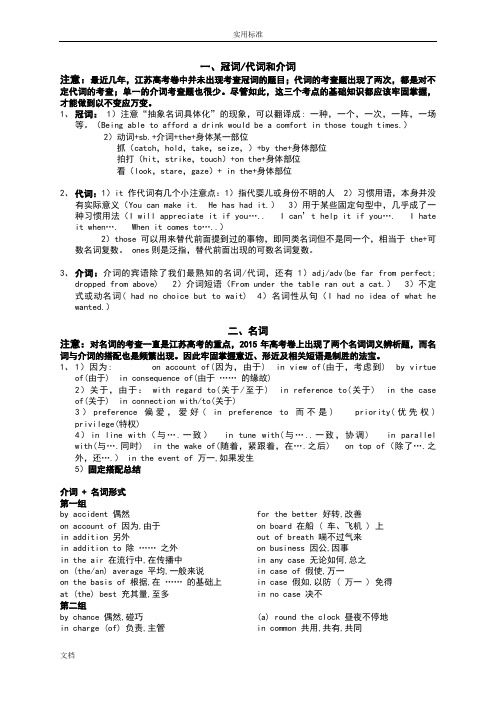
一、冠词/代词和介词注意:最近几年,江苏高考卷中并未出现考查冠词的题目;代词的考查题出现了两次,都是对不定代词的考查;单一的介词考查题也很少。
尽管如此,这三个考点的基础知识都应该牢固掌握,才能做到以不变应万变。
1、冠词: 1)注意“抽象名词具体化”的现象,可以翻译成: 一种,一个,一次,一阵,一场等。
(Being able to afford a drink would be a comfort in those tough times.)2)动词+sb.+介词+the+身体某一部位抓(catch,hold,take,seize,)+by the+身体部位拍打(hit,strike,touch)+on the+身体部位看(look,stare,gaze)+ in the+身体部位2、代词:1)it作代词有几个小注意点:1)指代婴儿或身份不明的人 2)习惯用语,本身并没有实际意义(You can make it. He has had it.) 3)用于某些固定句型中,几乎成了一种习惯用法(I will appreciate it if you….. I can’t help it if you…. I hate it when…. When it comes to…..)2)those可以用来替代前面提到过的事物,即同类名词但不是同一个,相当于the+可数名词复数。
ones则是泛指,替代前面出现的可数名词复数。
3、介词:介词的宾语除了我们最熟知的名词/代词,还有1)adj/adv(be far from perfect;dropped from above) 2)介词短语(From under the table ran out a cat.) 3)不定式或动名词( had no choice but to wait) 4)名词性从句(I had no idea of what he wanted.)二、名词注意:对名词的考查一直是江苏高考的重点,2015年高考卷上出现了两个名词词义辨析题,而名词与介词的搭配也是频繁出现。
2018高考英语必背知识点
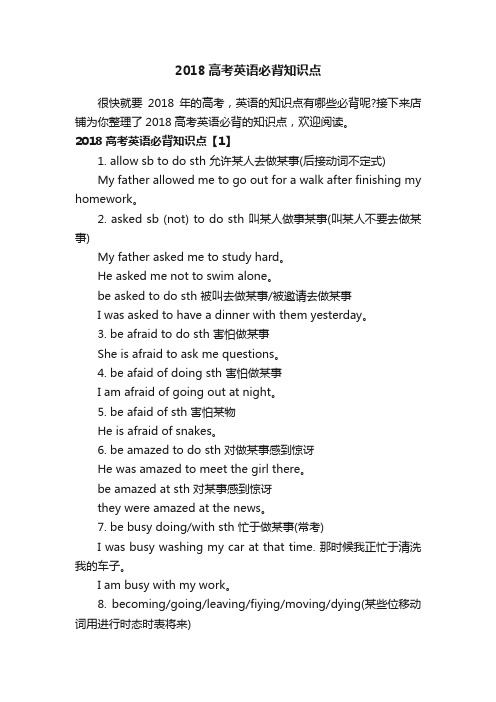
2018高考英语必背知识点很快就要2018年的高考,英语的知识点有哪些必背呢?接下来店铺为你整理了2018高考英语必背的知识点,欢迎阅读。
2018高考英语必背知识点【1】1. allow sb to do sth 允许某人去做某事(后接动词不定式)My father allowed me to go out for a walk after finishing my homework。
2. asked sb (not) to do sth 叫某人做事某事(叫某人不要去做某事)My father asked me to study hard。
He asked me not to swim alone。
be asked to do sth 被叫去做某事/被邀请去做某事I was asked to have a dinner with them yesterday。
3. be afraid to do sth 害怕做某事She is afraid to ask me questions。
4. be afaid of doing sth 害怕做某事I am afraid of going out at night。
5. be afaid of sth 害怕某物He is afraid of snakes。
6. be amazed to do sth 对做某事感到惊讶He was amazed to meet the girl there。
be amazed at sth 对某事感到惊讶they were amazed at the news。
7. be busy doing/with sth 忙于做某事(常考)I was busy washing my car at that time. 那时候我正忙于清洗我的车子。
I am busy with my work。
8. becoming/going/leaving/fiying/moving/dying(某些位移动词用进行时态时表将来)the bus is coming/the dog is dying。
2018年高考英语必备语法【四篇】
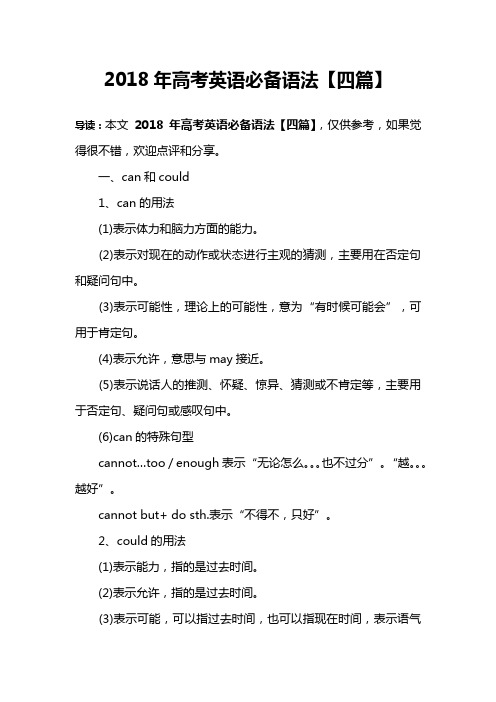
2018年高考英语必备语法【四篇】导读:本文2018年高考英语必备语法【四篇】,仅供参考,如果觉得很不错,欢迎点评和分享。
一、can和could1、can的用法(1)表示体力和脑力方面的能力。
(2)表示对现在的动作或状态进行主观的猜测,主要用在否定句和疑问句中。
(3)表示可能性,理论上的可能性,意为“有时候可能会”,可用于肯定句。
(4)表示允许,意思与may接近。
(5)表示说话人的推测、怀疑、惊异、猜测或不肯定等,主要用于否定句、疑问句或感叹句中。
(6)can的特殊句型cannot…too / enough表示“无论怎么。
也不过分”。
“越。
越好”。
cannot but+ do sth.表示“不得不,只好”。
2、could的用法(1)表示能力,指的是过去时间。
(2)表示允许,指的是过去时间。
(3)表示可能,可以指过去时间,也可以指现在时间,表示语气缓和。
(4)委婉客气地提出问题或陈述看法,指的是现在时间。
主要用于疑问句,回答时用can。
3、can与could的区别can表推测时只用于否定句和疑问句(could无此限制)。
couldn’t的可能性比can’t小。
4、can与be able to的区别(1)现在时:无区别,但后者不常用。
(2)完成时;can没有完成时,此时要用have(has,had)been able to。
(3)将来时:can没有将来时,要用will be able to。
(4)过去时:could表示一般能力,was/were able to 表示在具体场合通过努力成功做成某事的能力。
二、may 和might1、may的用法(1)表示询问或说明一件事可不可以做。
(2)表示一件事或许会发生或某种情况可能会存在,通常用在肯定句和否定句中。
注意:表示可能性时,can’t语气强,表示“不可能”,may not 语气弱,表示“可能不”。
2、might的用法(1)表示询问或允许,指的是过去时间。
2018年江苏高考英语重点语法知识讲解(易错点)

2018年江苏高考英语重点语法知识讲解(易错点)一、冠词/代词和介词注意:最近几年,江苏高考卷中并未出现考查冠词的题目;代词的考查题出现了两次,都是对不定代词的考查;单一的介词考查题也很少。
尽管如此,这三个考点的基础知识都应该牢固掌握,才能做到以不变应万变。
1、冠词:1)注意“抽象名词具体化”的现象,可以翻译成: 一种,一个,一次,一阵,一场等。
(Being able to afford a drink would be a comfort in those tough times.)2)动词+sb.+介词+the+身体某一部位抓(catch,hold,take,seize,)+by the+身体部位拍打(hit,strike,touch)+on the+身体部位看(look,stare,gaze)+ in the+身体部位2、代词:1)it作代词有几个小注意点:1)指代婴儿或身份不明的人2)习惯用语,本身并没有实际意义(You can make it. He has had it.)3)用于某些固定句型中,几乎成了一种习惯用法(I will appreciate it if you….. I can’t help it if you…. I hate it when…. When it comes to…..)2)those可以用来替代前面提到过的事物,即同类名词但不是同一个,相当于the+可数名词复数。
ones则是泛指,替代前面出现的可数名词介词+ 名词形式第一组by accident 偶然on account of 因为,由于in addition 另外in addition to 除…… 之外in the air 在流行中,在传播中on (the/an) average 平均,一般来说on the basis of 根据,在…… 的基础上at (the) best 充其量,至多for the better 好转,改善on board 在船( 车、飞机) 上out of breath 喘不过气来on business 因公,因事in any case 无论如何,总之in case of 假使,万一in case 假如,以防( 万一) 免得in no case 决不第二组by chance 偶然,碰巧in charge (of) 负责,主管(a) round the clock 昼夜不停地in common 共用,共有,共同in conclusion 最后,总之on condition that 在…… 条件下in confidence 信任in connection with/to 关于in consequence 因此,结果in consequence of 由于…… 的缘故on the contrary 反之,正相反in contrast with/to 与…… 成对照out of control 失去控制under control 被控制住at all costs 不惜任何代价at the cost of 以…… 为代价第三组in the course of 在…… 过程中,在…… 期间of course 当然,自然,无疑in danger 在危险中,垂危out of danger 脱离危险out of date 过期( 时) 的up to date 时新的in debt 欠债in detail 详细地in difficulties 处境困难in the distance 在远处off duty 下班on duty 值班,上班on earth 究竟,到底at all events 无论如何in any event 无论如何in effect 有效;实际上第四组in the event of 万一,如果发生for example 例如with the exception of 除…… 之外in the face of 面对,不顾,即使in fact 其实,实际上on fire 烧着on foot 步行in force 有效;实施中in favo(u)r of 有利于,赞成,支持in front of 在…… 面前in (the) future 今后,将来on guard 警惕,防范in general 通常,大体上in half 成两半at hand 在手边,在附近from tip to toe 彻头彻尾,完全by hand 用手hand down to 往下传,传给( 后代) 第五组hand in hand 手拉手,携手in hand 在掌握中,在控制中on hand 在手边,临近on (the) one hand... 一方面…… ,on the other hand... 另一方面……at heart 在内心;实质上by heart 牢记,凭记忆at home 在家,在国内;自在,自如in honor of 以纪念,向…… 表示敬意on one's honor 以名誉担保in a hurry 匆忙地,立即for instance 例如,举例说at intervals 不时,时时at last 最终,终于at least 至少,最低限度in the least 一点,丝毫第六组at length 终于,最后;详细地in the light of 按照,根据in line 成一直线,排成一行in line with 与…… 一致,按照at a loss 困惑,不知所措as a matter of fact 其实,事实上by all means 无论如何,必定by means of 借助于,用by no means 决不in memory of 纪念at the mercy of 在…… 支配下by mistake 错误地at the moment 现在,此刻for a moment 片刻,一会儿for the moment 现在,暂时in a moment 立刻,马上第七组in nature 本质上on occasion 有时,不时in order 秩序井然,整齐in group to 以便,为了in group that 以便out of order 发生故障,失调on one's own 独自地,独立地in particular 特别地,尤其,详细地in the past 在过去,以往in person 亲自in place 在适当的位置in place of 代替in the first place 起初,首先in the last place 最后out of place 不得其所的,不适当的on the point 即将…… 的时候第八组to the point 切中要害,切题in practice 在实际中,实际上out of practice 久不练习,荒疏at present 目前,现在for the present 目前,暂时in proportion to( 与……) 成比例的in public 公开地,当众for (the) purpose of 为了on purpose 故意,有意with the purpose of 为了in question 正在考虑at random 随意地,任意地at any rate 无论如何,至少by reason of 由于as regards 关于,至于with/in regard to 对于,就…… 而论第九组in/with relation to 关系到with respect to 关于as a result 结果,因此as a result of 由于…… 的结果in return 作为报答,作为回报on the road 在旅途中as a rule 规章,规则;通常,照例in the long run 最终,从长远观点看for the sake of 为了…… 起见on sale 出售;贱卖on a large scale 大规模地on a small scale 小规模地in secret 秘密地,私下地in a sense 从某种意义上说in shape 处于良好状态on the side 作为兼职,额外第十组at first sight 乍一看,初看起来in sight 被看到,在望out of sight 看不见,在视野之外in spite of 不管,不顾;尽管,虽然on the spot 当场,在现场in step 同步,合拍out of step 步调不一致,不协调in stock 现有,备有in sum 总而言之in tears 流着泪,含泪,哭in terms of 依据,按照;用…… 措词for one thing 首先,一则on the second thoughts 经重新考虑,一转念at a time 每次,一次at no time 从不,决不at one time 同时,曾经,从前曾第十一组at the same time 但是,然而at times 有时for the time being 目前,暂时from time to time 有时,不时in no time 立即,马上in time 及时,适时地on time 准时on top of 在…… 之上out of touch 失去联系in truth 事实上,实际上,的确on try 试穿by turns 轮流,交替地in turn 依次,轮流in vain 徒劳,无效a variety of 种种,各种by virtue of 由于第十二组by the way 顺便提一下,另外by way of 经由,通过…… 方式in a way 在某点,在某种程度上in no way 决不in the way of 妨碍in one's/the way 妨碍,阻碍after a while 过了一会,不久for a while 暂时,一时on the whole 总的来说in a word 总而言之in other words 换句话说,也就是说at work 在工作,忙于out of work 失业in the world 到底,究竟动词+ 名词形式第十三组have/gain access to 可以获得take...into account 考虑gain/have an advantage over 胜过,优于pay the way for 为…… 铺平道路take advantage of 利用,趁…… 之机pay attention to 注意do/try one's best 尽力,努力get the best of 胜过make the best of 充分利用,妥善处理get the better of 打败,致胜catch one's breath 屏息,歇口气take care 小心,当心take care of 照顾,照料take a chance 冒险一试take charge of 担任,负责keep company with 与…… 交往,与…… take delight in 以…… 为乐with delight 欣然,乐意地第十四组make a/the difference 有影响,很重要carry/bring into effect 使生效,使起作用put into effect 实行,生效come/go into effect 生效,实施take effect 生效,起作用catch one's eye 引人注目keep an eye on 留意,照看make a face 做鬼脸find fault 埋怨,挑剔catch fire 着火come/go into force 生效,实施make friends 交朋友,友好相处be friends with 对…… 友好,与…… 交上朋友make fun of 取笑,嘲弄keep one's head 保持镇静lost one's head 不知所措第十五组lose heart 丧失勇气,失去信心get/learn by heart 记住,背诵get hold of 抓住,掌握keep house 管理家务,做家务throw/cast light on 使明白,阐明bear/keep in mind 记住have in mind 记住,考虑到,想到make up one's mind 下决心come/go into operation 使投入生产,使运转put in order 整理,检修keep/hold pace with 跟上,与…… 同步play a part 起作用take place 发生,进行take the place of 代替come to the point 说到要点,扼要地说bring/carry into practice 实施,实行第十六组make progress 进步,进展give rise to 引起,使发生make sense 讲得通,有意义catch the sight of 发现,突然看见(go) on the stage 当演员take one's time 不急不忙,从容进行keep in touch 保持联系keep track 通晓事态,注意动向lose track 失去联系make use of 利用put to use 使用,利用give way 让路,让步lead the way 带路,引路make one's way 前进,进行make way 让路,开路keep one's word 遵守诺言第十七组act on 作用appeal to 呼吁,要求attempt at 企图,努力attitude to/towards 态度,看法a great/good deal of 大量( 的) ,许多( 的) influence on 影响interference in 干涉interference with 妨碍,打扰introduce to 介绍a lot (of) 许多( 的) ,大量( 的)lots of 大量,很多fall in love with 相爱,爱上a matter of( 关于……) 的问题a number of 若干,许多reply to 回答,答复a series of 一系列,一连串英语常考词语固定搭配(四) 第十九组trolley bus 电车I. D. card 身份证credit card 信用卡no doubt 无疑,必定next door 隔壁out of doors 在户外face to face 面对面地as matter of fact 实际情况,真相a few 有些,几个quite a few 还不少,有相当数目的a little 一点,稍微,一些,少许little by little 逐渐地quite a little 相当多,不少no matter 无论the moment (that)一…… 就no more 不再第二十组fair play 公平竞赛;公平对待in demand 有需要,销路好rest room 厕所,盥洗室primary school 小学side by side 肩并肩,一个挨一个heart and soul 全心全意step by step 逐步ahead of time 提前all the time 一直,始终once upon a time 从前once in a while 偶尔,有时no wonder 难怪,怪不得word for word 逐字地decline with thanks 婉言谢绝动词+ 介词形式第二十一组account for 说明( 原因等)aim at 瞄准,针对allow for 考虑到appeal to 呼吁,要求arrive at 达成,得出ask after 询问,问候ask for 请求,要求attach to 附属于,隶属于begin with 从开始break into 闯入break off 断绝,结束break through 突破break up 中止,结束;打碎,折断bring about 带来,造成bring down 打倒,挫伤;降低bring forth 产生,提上第二十二组bring forward 提出bring out 使出现;公布;出版bring up 教育,培养,使成长build up 积累;堵塞;树立,逐步建立;增进;锻炼call for 邀请;要求;需求call forth 唤起,引起;振作起,鼓起call off 放弃,取消catch at 抓住( 东西) call on/upon 访问,拜访;号召,呼吁call up 召集,动员;打电话care for 照管,关心;喜欢,意欲carry off 夺去carry on 继续下去;从事,经营carry out 贯彻,执行;实现come to 总计,达到;苏醒,复原count on 依靠;期待,指望count up 把…… 相加第二十三组cover up 掩饰,掩盖cut across 走捷径,抄近路deal with 处理,对付,安排do without 没有…… 也行fill in/out 填充,填写get at 得到,接近;意思是get into 进入,陷入go after 追求go into 进入;研究,调查go for 竭力想取得;喜爱;支持,拥护go through 经历,经受;详细检查go with 伴随,与…… 协调go without 没有…… 也行improve on 改进keep to 保持,坚持lie in 在于live up to 不辜负第二十四组live on/by 靠…… 生活,以…… 为食live through 度过,经受过look after 照管,照料look at 看望,注视look for 寻找,寻求look into 调查,观察,过问;窥视look over 检查,查看,调查look through 仔细查看,浏览,温习make for 走向,驶向;有助于occur to 被想到,被想起play with 以…… 为消遣,玩弄refer to 参考,查阅,涉及,提到run for 竞选run into 撞上,偶然碰见see to 注意,负责,照料,修理send for 派人去请,召唤;索取第二十五组send in 呈报,递交,送来serve as 作为,用作set aside 挑出,拨出,留出;拒绝sit for 参加stand by 支持,帮助;袖手旁观stand for 代替,代表,意味着stand against 反抗,抵抗stick to 坚持,忠于,信守take after 与…… 相像take for 把…… 认为是,把…… 看成是take in 接受,吸收;了解,理解take to 喜欢,亲近touch on 关系到,涉及turn into 变成turn to 变成;求助于,借助于turn off 关上;出产;解雇动词+ 副词形式第二十六组break down 损坏,分解,瓦解break in 闯入;打断,插嘴break out 逃出;突然发生,爆发bring to 使恢复知觉burn out 烧掉burn up 烧起来,旺起来;烧完catch on 理解,明白check in 办理登记手续check out 结账后离开;检验,核查check up (on) 校对,检查,检验cheer up 使高兴,使振奋clear away 扫除,收拾clear up 收拾;澄清;放晴make it clear that 弄清楚come off 实现,成功,奏效come on 请,来吧,快点;开始,出场,上演come out 出版;出现,显露;结果是第二十七组come round (around) 来访,前来;苏醒,复原come through 经历,脱险come up 走近,上来;发生,被提出cross out 删去,取消cut back 削减,减少cut down 削减,降低cut in( 汽车) 抢道;插嘴,打断cut off 切断;删去;停止cut out 删除cut short 突然停止die down 渐渐消失,平息die out 消失,灭绝draw in( 火车、汽车) 到站draw up 写上,画上;草拟;停住dress up 穿上盛装,打扮得很漂亮drop by/in 顺便来访dry out 干透,使干dry up 干涸,枯竭第二十八组drop off 减弱,减少drop out 退出,离队fall behind 落后fall out 争吵;结果是fall through 落空,失败feed in 输入find out 查明get across 解释清楚,使人了解get around/round 走动,旅行;( 消息) 传开get away 逃脱,离开get by 通过,经过get down 从…… 下来;写下get in 进入;收获,收集get off 从…… 下来;离开,动身,开始get over 克服;( 从病中) 恢复过来get through 结束,完成;接通电话have got to (do) 不得不,必须第二十九组get together 集合,聚集get up 起床;增加,增强give away 泄露;分送give back 送还,恢复give in 交上;投降,屈服give off 放出,释放give out 分发,放出give up 停止,放弃go ahead 开始,前进;领先go by 过去go down 下降,降低;被载入,传下去go off 爆炸,发射;动身,离开go out 外出;熄灭go over 检查,审查;复习,重温go round/around 足够分配go under 下沉,沉没;失败;破产go through 通过,审查,完成第三十组go up 上升,增加;建起hand down 流传下来,传给,往下传hand in 交上,递交hand on 传下来,依次传递hand out 分发,散发,发给hand over 交出,移交,让与hang about 闲荡,徘徊,逗留hang back 犹豫,踌躇,畏缩hang on 抓紧不放;继续下去hang up 挂断( 电话) have back 要回,收回have on 穿着,戴着hold back 踌躇,退缩;阻止,抑制hold on 继续,握住不放hold out 维持,支持;坚持,不屈服hold up 举起,阻挡,使停止;抢劫第三十一组hurry up( 使) 赶快,迅速完成keep back 阻止,阻挡;隐瞒,保留keep down 控制,压制,镇压;压低keep off 不接近,避开keep up 保持,维持;继续,坚持let down 放下,降低;使失望let in 让…… 进入,放…… 进来let off 放( 烟,烟火) ,开( 枪) let out 放掉,放出,发出line up 排队,使排成一行look back 回顾,回头看look out 留神,注意,提防,警惕look on 旁观,观看;看待,视作look up 查阅,查考;寻找( 某人)look in 顺便看望make out 辨认,区分;理解,了解make out of 用…… 做,从…… 得出第三十二组make up 构成,拼凑;弥补,赔偿;化装mix up 混淆,混合,搞糊涂pass away 去世,逝世pass off 中止,停止pass to 转到,讨论,传到pass out 失去知觉,昏倒pay back 偿还,回报pay off 还清( 债)pay down 即时交付,用现金支付pay up 全部付清第三十三组pick out 选出,挑出,拣出;辨认,辨别出pick up 拾起, ( 偶然) 得到;( 车船) 中途搭( 人) ,学会pull down 拆毁,拉倒;拉下,降低pull in( 车) 停下,进站,船( 到岸)pull off 脱( 帽、衣) pull on 穿,戴pull out 拔出,抽出;( 车、船) 驶出pull together 齐心协力pull up( 使) 停下put across 解释清楚,说明put aside 储存,保留put away 放好,收好;储存put down 记下,放下;镇压,平定put forward 提出put in 驶进put on 穿上,戴上;上演;增加( 体重)put out 熄灭,关( 灯) ;出版,发布;生产put right 改正( 错误) ,整理第三十四组put up 提起,举起,提( 价) ;为…… 提供食宿,投宿ring off 挂断电话rub out 擦掉,拭去run down 撞倒,撞沉;追捕,追查run off 复印,打印run over 略读,略述;辗过,浏览,匆匆复习see off 给…… 送行see through 看穿,识破;干完,干到底set back 推迟,延缓,阻碍set down 卸下,放下,记下,记入set forth 阐明,陈述set off 出发,动身;引起,使发生set out 陈列,显示;动身,起程;制定set up 创立,建立,树立;资助,扶持show in 领入show off 炫耀,卖弄第三十五组show up 使呈现,使醒目shut out 排除sit in 列席,旁听sit up 迟睡,熬夜speed up 使加速stand out 突出,显眼stand up 站起来,耐用step up 提高,加快,加紧step in 插入,介入stick out 伸出,突出;坚持到底,继续take away 消除;消耗take down 记下,写下take off 拿走,脱下;起飞take on 呈现;接纳,承担,从事take over 接管,接办take up 占据;开始;拿起,接收take up with 和…… 交往,忍受,采用第三十六组think over 仔细考虑throw away 扔掉,抛弃touch up 润色,改进turn down 拧小,调低;拒绝turn in 交出,上缴;转身进入turn off 关掉,断开;拐弯,叉开turn on 接通,打开turn out 制造,生产;结果是turn over 翻过来;移交,转交turn up 开大;出现;来到;发生use up 用完,花完warm up 变热wear off 逐渐消失wear out 用破;耗尽,使精疲力竭while away 消磨( 时间)wipe out 擦去,抹去;消灭,毁灭work out 解决,算出;弄懂,制定出work up 引起,激起;逐渐上升work on 从事于,努力做write off 报废,勾销,注销后接动名词的固定搭配第三十七组aim at 目的在于,旨在;瞄准accuse...of... 控告;谴责depend on 取决于devote to 奉献,致力engage in 从事于,忙着;订婚feel like 欲,想要go on 继续;发生cannot/couldn?t help 禁不住;不得不insist on 坚持keep from 使…… 不( 做)keep on 继续不断,保持look forward to 盼望,期待persist in 坚持,持续prevent from 预防,防止put off 推迟,推延set about 开始,着手succeed in 成功thank for 感谢think of 想起,想到;想一想三、形容词和副词注意:近几年江苏高考对形容词和副词的考查主要是词义辨析,而且通过语境来区别。
(完整word版)2018高考英语语法专题名词.docx

语法部分第二部分语法专题讲析一名考点一名的固定搭配①[2016 ·天津 ]The dictionary is out of date:many words have been added to the language since it was published.本典了:自从它出版以来,种言已增加了多。
②[2015 ·江 ]Some schools will have to make adjustments in agreement with the national soccer reform.些学校将不得不作出一些整来和国家足球改革保持一致。
1. have,keep,take,make,get,pay,play,give,put 等加名构成的短have a good reputation有个好的名声have an idea of了解have a sense of有⋯⋯意have a feeling of有⋯⋯感have access to可以得have an advantage over,于keep a balance保持平衡take...into account考⋯⋯take advantage of利用;趁⋯⋯之机make fun of 取笑,嘲弄make the best of充分利用;妥善理get/lose contact with与⋯⋯取得 /失去系get relief 得到解give a solution 出解决方案put...into practice 将⋯⋯付行2.介词后加名词构成的短语in great demand需求量很大in quantity 大量,大批in progress在进行中in production 在产量方面out of one's reach某人够不到out of touch 失去联系out of sight 看不见beyond recognition 辨认不出来without permission 未经允许考点二名词的单复数①[2015 ·江苏 ] —Go and say sorry to your Mom, Dave.—I'd like to , but I'm afraid she won't be happy with my apology/apologies.——戴夫,去向你妈妈道歉。
最新2018年高考英语必背知识点
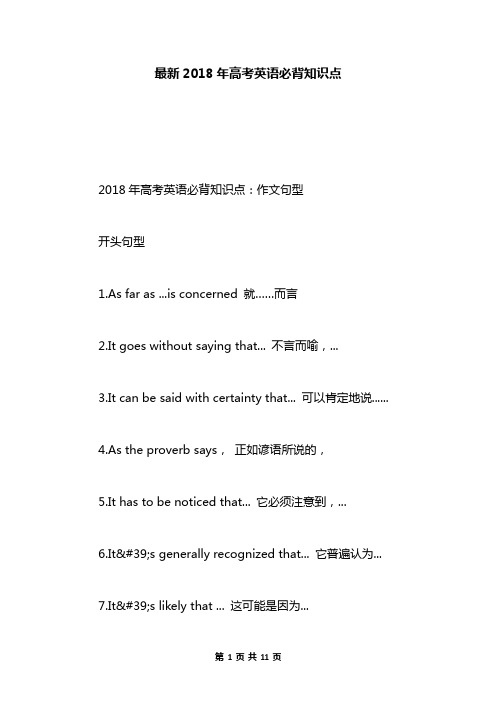
最新2018年高考英语必背知识点2018年高考英语必背知识点:作文句型开头句型1.As far as ...is concerned 就……而言2.It goes without saying that... 不言而喻,...3.It can be said with certainty that... 可以肯定地说......4.As the proverb says,正如谚语所说的,5.It has to be noticed that... 它必须注意到,...6.It's generally recognized that... 它普遍认为...7.It's likely that ... 这可能是因为...8.It's hardly that... 这是很难的......9.It's hardly too much to say that... 它几乎没有太多的说...10.What calls for special attention is that...需要特别注意的是11.There's no denying the fact that...毫无疑问,无可否认12.Nothing is more important than the fact that... 没有什么比这更重要的是…13.what's far more important is that... 更重要的是…衔接句型1.A case in point is ... 一个典型的例子是...2.As is often the case...由于通常情况下...3.As stated in the previous paragraph 如前段所述4.But the problem is not so simple. Therefore 然而问题并非如此简单,所以……5.But it's a pity that... 但遗憾的是…6.For all that...对于这一切...... In spite of the fact that...尽管事实......7.Further, we hold opinion that... 此外,我们坚持认为,8.However , the difficulty lies in...然而,困难在于…9.Similarly, we should pay attention to... 同样,我们要注意...10.not(that)...but(that)...不是,而是11.In view of the present station.鉴于目前形势12.As has been mentioned above...正如上面所提到的…13.In this respect, we may as well (say) 从这个角度上我们可以说14.However, we have to look at the other side of the coin, that is... 然而我们还得看到事物的另一方面,即…用于引言段的句型1. Some people think that …. 有些人认为…To be frank, I can not agree with their opinion for the reasons below. 坦率地说,我不能同意他们的意见,理由如下。
(完整word版)2018年高考英语语法知识最全概括

高考英语语法易考知识点最全概括第一讲座:名词---基础篇一、名词的复数:1. 名词变复数的规则形式:1). 一般情况下直接加s:book------books cup-----cups2). 以辅音字母+y结尾的,先变y为i再加es:city-------cities family-----families3). 以s、x、sh、ch结尾的加es:bus-----buses wish------wishes watch------watches4). 以o结尾的多数加S 初中阶段只有三个单词加es:tomato-----tomatoes potato------potatoes hero-----heroes Negroes5). 以f、fe 结尾的,先把f、fe变v 再加es:leaf----leaves self---selves shelf----shelves life----lives thief---thieves2. 少数名词的复数形式是不规则的:man----men woman---women child----children foot-----feet tooth----teeth mouse---mice3. 单数和复数形式相同:deer---deer fish----fish sheep----sheep Chinese ----Chinese Japanese---Japanese4. 某国人的复数:1). 中、日不变:Chinese----Chinese Japanese---Japanese2). 英、法变:Englishman----Englishmen Frenchman----Frenchmen3).其余s加后面:American-----Americans German----Germans Australian---Australians二、不可数名词:1. 不可数名词:1). 不能直接用数字表数量;2). 不能直接加a或an;3). 没有复数形式;4). 可用some、any、lots of、plenty of、much 修饰;5). 可用“量词短语”表示;2. 不可数名词的数量的表示方法:a / 数字+ 量词+ of + 不可数名词:a piece of paper a cup of tea a glass of milk三、名词的所有格:1. ’s 所有格:1). 用and连接两个并列的单数名词表示共有关系时,这时只在最后一个名词后加“’s.”:This is ____________________(Mary and Lily) bedroom.2). 用and连接两个并列的单数名词表示各有关系时,这时分别在每个名词后加“’s.”:These are ________________(Tom and Jack ) school bags.3). 以s结尾的名词,变所有格时在s后加“’”, 不以s 结尾的复数名词,仍加“’s”:Teachers’ Day Children’s Day4). 表示店铺、医院、诊所、住宅等名称时,常在名词后加’s 代表全称:at the doctor’s at the Bob’s5). 由some、any、no、every与one、body 结合的复合不定代词something、anything 等和else 连用时,所有格应加在else的后面:This is _________________(somebody else ) pencil.6). 表示时间、距离、国家、城市等无生命的名词,也可在词尾加’s 来构成所有格:an hour’s ride two weeks’ time China’s capital2. of 所有格:1). of 用来表示无生命的名词所有格:the map of China the door of the room2). 双重所有格:of + 名词所有格of + 名词性的物住代词He is a friend of my _________(brother ).Is she a daughter of __________(you)?四、名词作句子成分:1. 名词作主语:1). 表示时间、金钱、距离作主语时,谓语动词用单数:Two hours ________(be) enough for us to get there.2). 量词短语“数字+量词+ of +…”作主语时,谓语动词应与量词保持一致:A pair of shoes _______(be) under the bed.Two pieces of paper _______(be) on the desk.3). 名词+介词(with、but、except、along with、as well as …….)+名词作主语时,谓语动词应与前面的名词保持一致:The teacher with the students _________(be) planting trees on the hill.4). 短语“neither…nor…、either…or…、not only…but also …”连接主语时,谓语动词实行就近原则:Neither he nor I ______ (be) a Frenchman.2. 名词作定语:1). 名词作定语时,一般用单数形式:There is a shoe factory near the school.2). 名词作定语时,个别情况用复数形式:(sport )The sports meeting will be held next week.3). man、woman 作定语表示性别时,man、woman随后面的名词单复数而变:one man teacher two women teachers第二讲座:名词---提高篇一、名词的单复数:1. 可数名词的复数不规则变化:(1) 单复数同形:deer, sheep, Chinese, means, series, species, works, headquarters(2) 形单意复:people, police, youth, cattle, staff(3) 形复意单:news, physics, politics, maths(4)合成词变复数:passerby→passersby, soninlaw→sonsin-law, lookeron→lookerson, gobetween→go-betweens, grownup→grownups(5) 词形变化:man→men, child→children,tooth→teeth, foot→feet, mouse→mice,medium→media2. 不可数名词的数:(1) 有些抽象名词在具体化时,以复数形式出现;表示特指时,可以和定冠词连用;表示“某种”或“一次”的意义时,可以和不定冠词连用:in surprise“惊讶地”,a surprise“一件令人惊讶的事”;win success“获得成功”,a success“一个/件成功的人/事”;by experience“靠经验”,an experience“一次经历”;with pleasure“乐意”,a p leasure“一件乐事”。
2018年高考英语语法大全(绝对精品)
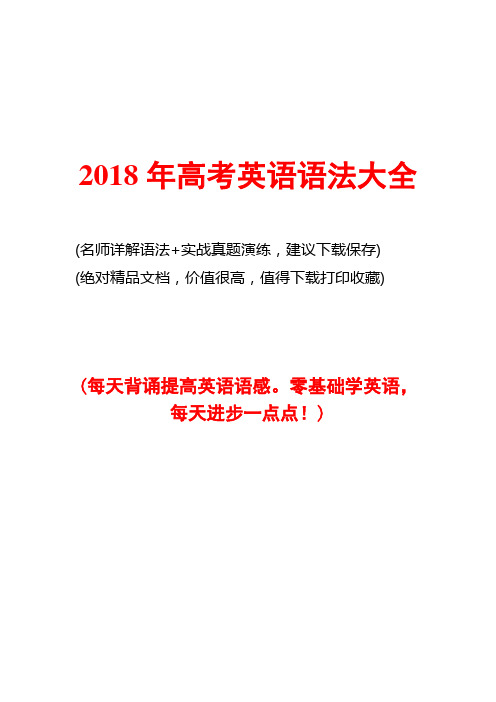
2018年高考英语语法大全(名师详解语法+实战真题演练,建议下载保存) (绝对精品文档,价值很高,值得下载打印收藏)(每天背诵提高英语语感。
零基础学英语,每天进步一点点!)第一讲:名词和主谓一致1.名词的分类名词是用来表示人、事物、地点、现象及其他抽象概念等的词。
可以分为专有名词和普通名词,专有名词是某个(些)人,地方,机构等专有的名称,如Beijing,China等。
普通名词是一类人或事物或是一个抽象概念的名词,如:book,sadness等。
普通名词又可分为下面四类:1)个体名词:表示某类人或东西中的个体,如:gun、man 、desk.2)集体名词:表示若干个个体组成的集合体,如:family,class, army3)物质名词:表示无法分为个体的实物,如:air,rice,iron4)抽象名词:表示动作、状态、品质、感情等抽象概念,如:work,happiness2.名词的数可数和不可数名词个体名词和集体名词可以用数目来计算,称为可数名词,物质名词和抽象名词一般无法用数目计算,称为不可数名词。
归纳一下,名词的分类可以下图表示:可数名词有单数和复数的变化,而单复数的变化又分为规则变化和不规则变化两种。
1.注意以下名词数的概念①以s结尾,仍为单数的名词(多为学科名词)physics, mathematics, politics, statistics, news, the United States goods,②集合名词:表示一类事物的集合或总称,没有复数形式machinery, furniture, equipment, technology, luggage, baggage, homework, evidence ③单数和复数形式表达不同的意思custom风俗,习惯—customs海关damage损害—damages赔偿金good好处,利益—goods货物time时间—times时代,次数,倍数fish 鱼肉—fishes 各种鱼paper 纸—papers 试卷,文件water 水—waters 水域room 空间—rooms 房间time 时间—times 时代arm 手臂—arms 武器④形式上虽是单数,但表示的是复数含义people, police, cattle, staff, public, the+adj.(the rich富人), the+分词(the wounded伤员)⑤只有复数形式的名词:glasses (眼镜)trousers clothes scissors⑥集体名词的数family, team, audience, class, club, committee, group, enemy, cattle, government,等集体名词注意其主谓一致,一般来说,视为整体时作单数看待,侧重其成员时则作复数看待。
2018年江苏高考英语重点语法知识讲解(易错点)

一、冠词/代词和介词注意:最近几年,江苏高考卷中并未出现考查冠词的题目;代词的考查题出现了两次,都是对不定代词的考查;单一的介词考查题也很少。
尽管如此,这三个考点的基础知识都应该牢固掌握,才能做到以不变应万变。
1、冠词:1)注意“抽象名词具体化”的现象,可以翻译成: 一种,一个,一次,一阵,一场等。
(Being ableto afford a drink would be a comfort in those tough times.)2)动词+sb.+介词+the+身体某一部位抓(catch,hold,take,seize,)+by the+身体部位拍打(hit,strike,touch)+on the+身体部位看(look,stare,gaze)+ in the+身体部位2、代词:1)it作代词有几个小注意点:1)指代婴儿或身份不明的人2)习惯用语,本身并没有实际意义(You can make it. He has had it.)3)用于某些固定句型中,几乎成了一种习惯用法(I will appreciate it if you….. I can’t help it if you…. I hate it when…. When it comes to…..)2)those可以用来替代前面提到过的事物,即同类名词但不是同一个,相当于the+可数名词复数。
ones则是泛指,替代前面出现的可数名词复数。
3、介词:介词的宾语除了我们最熟知的名词/代词,还有1)adj/adv(be far from perfect; dropped from above)2)介词短语(From under the table ran out a cat.)3)不定式或动名词( had no choice but to wait) 4)名词性从句(I had no idea of what he wanted.)二、名词注意:对名词的考查一直是江苏高考的重点,2015年高考卷上出现了两个名词词义辨析题,而名词与介词的搭配也是频繁出现。
2018年江苏高考英语重点语法知识讲解(易错点)
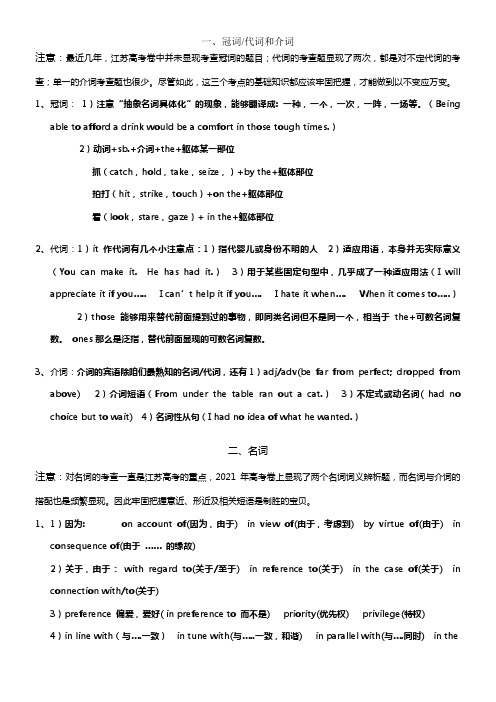
一、冠词/代词和介词注意:最近几年,江苏高考卷中并未显现考查冠词的题目;代词的考查题显现了两次,都是对不定代词的考查;单一的介词考查题也很少。
尽管如此,这三个考点的基础知识都应该牢固把握,才能做到以不变应万变。
1、冠词:1)注意“抽象名词具体化”的现象,能够翻译成: 一种,一个,一次,一阵,一场等。
(Beingable to afford a drink would be a comfort in those tough times.)2)动词+sb.+介词+the+躯体某一部位抓(catch,hold,take,seize,)+by the+躯体部位拍打(hit,strike,touch)+on the+躯体部位看(look,stare,gaze)+ in the+躯体部位2、代词:1)it作代词有几个小注意点:1)指代婴儿或身份不明的人2)适应用语,本身并无实际意义(You can make it. He has had it.)3)用于某些固定句型中,几乎成了一种适应用法(I will appre ciate it if you….. I can’t help it if you…. I hate it when…. When it comes to…..)2)those能够用来替代前面提到过的事物,即同类名词但不是同一个,相当于the+可数名词复数。
ones那么是泛指,替代前面显现的可数名词复数。
3、介词:介词的宾语除咱们最熟知的名词/代词,还有1)adj/adv(be far from perfect; dropped fromabove) 2)介词短语(From under the table ran out a cat.)3)不定式或动名词( had no choice but to wait) 4)名词性从句(I had no idea of what he wanted.)二、名词注意:对名词的考查一直是江苏高考的重点,2021年高考卷上显现了两个名词词义辨析题,而名词与介词的搭配也是频繁显现。
- 1、下载文档前请自行甄别文档内容的完整性,平台不提供额外的编辑、内容补充、找答案等附加服务。
- 2、"仅部分预览"的文档,不可在线预览部分如存在完整性等问题,可反馈申请退款(可完整预览的文档不适用该条件!)。
- 3、如文档侵犯您的权益,请联系客服反馈,我们会尽快为您处理(人工客服工作时间:9:00-18:30)。
2018年高考英语语法大全(名师详细讲解语法+配套实战练习,零基础也可以学好英语,建议下载保存)(绝对精品文档,价值很高,值得下载打印收藏)(每天背诵提高英语语感。
零基础学英语,每天进步一点点!)卷首寄语Wilkins指出:“没有语法不能很好地表达,而没有词汇则什么也不能表达。
”语言的学习是一个漫长又艰难的过程,而语法与语言能力之间的关系也是紧密关联的。
语法是语言的应用规则,虽然wilkins更加着眼于词汇,但对于母语为非英语语言的学生来讲,在学习英语的过程中系统地学习一些基础语法,是提高学生应用语言能力的一个有效途径。
对于目前国内中高考考生来讲,语法知识也是应试考核的一个重要项目,尤其是对于中考高考生,语法项目的考核占有很大的卷面比例。
具体考核题型以单项选择、用所给词适当形式填空,句型转换为主基于这样的考核模式,对于中考高考考生来讲,在整合应试能力的过程中,系统地学习语法知识,并进行大量的练习的必要性则是显而易见的了。
这本小册子针对初高中学生的认知水平和语言解构能力,较通俗浅显地对大纲要求的语法项目,并附加了一部分习题,希望该册子对中考高考考生能有所助益。
一、冠词用法小结冠词的用法在英语学习中较为复杂,千头万绪,尤其是惯用法,请同学们平时学习时注意积累。
以下不过是谈谈冠词的一些常规的用法。
一、不定冠词的用法:1、泛指人或事物的类别,相当于any, 如:A hammer is tool. A steel worker makes steel.2、泛指某人或某物。
A boy is waiting for you. There is a book on your desk.3、表one或every。
We work 8 hours a day. I go home twice a month.4、表示the same 的意思。
Birds of a (= the same) feather flock together; people of a kind come together.5、用在不可数名词前a)(用在物质名词前)一种,一份A large coffee for me. It was a wonderful tea.b)(用在某些表示风、雨等的名词前)It was clear daylight now and a fine rain was falling. There is a cold wind this morning.c)(用在抽象名词前)一种That is a great disappointment. It’s a pleasure to work with you.6、(用在某些专有名词前)某个叫…的人,一张…的画,一个象…的人等。
I saw a Mrs. Smith on the 12th at 2:00. He had a Van Gogh in the dining-room.What a strange London they saw! He’s a living Lei Feng.7、用于某些固定词组中。
a few, a little, a good many, a lot of, all of a sudden, as a rule, have a cold等。
8、在元音音素开头的名词前应用an, 如an apple, an English book。
要以发音为准,并非以元音字母而定。
如a university, an hour, an “h”, an X-ray examination.二、定冠词的用法。
1、表特定的或上文提到的人或物。
The boy likes the film. Shut the door, please.The old poor peasant has a son. The son is a model worker.2、表示世界上独一无二的东西。
the earth, the moon, the stars, the sun(但space前不用)3、用在序数词、形容词或副词最高级前。
the second, the tallest, the last, the first.4、用在由普通名词构成的国家、党派或组织机构等的专有名词前。
the United States; the People’s Republic of China; the Communist Party of China; the ChinesePeople’s Liberation Army; the No. 15 Middle School; the department of Education.5、用在某些建筑物名称前。
The Great Hall of the P eople; the Monument to the People’s Heroes; the Great Wall; the Capital Theatre; the Space Museum; the Peace Hotel。
6、用在江河海洋,山脉群岛,海峡海湾等专有名词前。
The Changjiang River, the Red Sea, the Dabie Mountains, the English Channel, the Taiwan Straits, the Persian Gulf。
7、用在报纸、会议、条约等专有名词前。
the People’s Daily(但:China Daily)the New York Times, the 15th Party Congress, the Geneva Agreement8、用在方位名词前,某些习惯短语中或结构搭配中。
on the left, in the east, in the morning, on the other hand, in the end, hit sb on the head, catch sb by the arm9、用在形容词前表一类人。
the poor, the dead, the young, the rich, the wounded.10、用在双方都知,不言而喻的名词前。
Give me the book. Who’s the man?用在姓氏复数前表示一家人或夫妇二人。
the Smiths, the Greens, the Wangs, the Turners11、用在单数可数名词前泛指某类人或物(指整个一类)。
The horse is a useful animal.The computer was invaded not long ago. (但更多时候表特指:The horse is ill. )12、指世纪的年代。
in the 1890’s或in the 1890s13、用在表示乐器的名词前。
play the piano (the guitar, the violin, the flute)14、用在某国语言前,构成the … language的形式。
The English language is very widely used all over the world.如果单用国家变来的语言名词形式,则不用the。
Chinese has the largest number of speakers in the world.15、用于“论(或按)……计”之类的意思。
He got paid by the hour. They sell the cloth by the meter.三、不用冠词的场合。
1、专有名词、物质名词、抽象名词、人名、地名前一般不用冠词。
China, Johnson; Air is matter. Sound is invisible.2、当名词已被指示代词、物主代词、名词所有格限制时。
This book is good. I read my English book every day.3、注:指示代词和物主代词亦不能并用。
*my that book, 应该说:that book of mine.街名、广场名、公园名前。
Wall Street. Tian’anmen Square, Hyde Park.4、省市、大学名前。
Hubei Province (但the Province of Hubei); Wuhan City(但the City of Wuhan); Qinghua University(但:the University of Qinghua)5、湖泊前一般不用冠词。
East Lake, Salt Lake, Dongting Lake6、山峰前不用冠词。
Mount Hua, Mount Tai, Mount Everest7、月份、星期、节日、三餐饭的名词前。
March, Christmas, Sunday; Have you had lunch? Spring is the best season of the years.(但月份或季节被限定则须冠词。
I arrived here in the winter of 1993.)8、称呼语,表示头街或职务作宾补或同位语的名词。
What’s this, John?We made Li Hai monitor.9、学科名、球类、棋类名词六前。
We like maths. They often play football.10、泛指的复数名词前。
Students must work hard at their lesson.11、与by连用的交通工具或表示方式、手段的名词前。
by bus, by hand, by radio, by air, by water.冠词用法巩固练习1.—I’m afraid I dare not speak in ______ public.— Just have ______ try.A. a; 不填;B. 不填; aC. the; aD. the; the2.As you know, _____ man can’t live without ____ water.A. 不填; 不填;B. a; theC. a; 不填;D. 不填; the3.The police have ______ power to arrest bad people by _____ law.A. the; theB. 不填; theC. 不填; 不填;D. the; 不填;4.Paris is ______ most beautiful city, where you can see _____ famous Eiffel Tower.A. a; theB. a; 不填;C. the; aD. 不填; the5.— Do you like the novels?—I don’t like either of them. Please show me _______ third one.A. aB. theC. XD. an6.Keep away from the cage. _____ lion is ______ fierce animal.A. The; theB. A; theC. A; 不填;D. The; a7.The class named _______ Lei Fang is one of the best classed in this school.A. in honor ofB. in the place ofC. in favor ofD. in the way of8.— What about ______ bike?— Do you think it all right to buy him that bike as ____ birthday gift?A. a; aB. the; aC. a; theD. the ; the9.First aid is _____ science of giving ____ medical care to ______ person.A. the; 不填; aB. the; the; aC. a; 不填; theD. 不填; a; the10.Please pay attention to your spelling. You’ve dropped _____ “n” here.A. anB. theC. 不填;D. a11.Bill Clinton took _____ office on January 20th, 1993, and became _______ 42nd US President.A. an; theB. 不填; theC. the; 不填;D. 不填; 不填;12.— Have you seen _______ pen? I left it here this morning?— I think I saw _____ one somewhere. Is it ______ red one?A. a; the; aB. a; a; theC. the; 不填; aD. a; 不填; a13.— The news is spreading from mouth to mouth.—Yes, it’s become ______ talk of _____ town.A. a; aB. the; 不填;C. the; theD. a; 不填;14.Now the machine runs at double _______.A. a speedB. speedC. the speedD. for speed15.— I hope you will be ready to leave on time.—Don’t worry. I’ll be ready ____ the taxi arri ves.A. by the timeB. in time forC. at the time ofD. until the time when16.If he goes on swimming in that lake for _____ four hours, he _______ in it for twelve hours.A. another; will have been swimmingB. a; will swimC. other; has swumD. the; will be swimming17.— Charley Oakley, _______ NBA All-star, hasn’t missed ______ game in past three years.—I can’t believe it.A. an; aB. a; theC. the; aD. an; the18.— What did you think of the place?—I didn’t car for it at ____ first, but after _____ tim e I got to like it.A. 不填; theB. the; aC. the; 不填;D. 不填; a19.— In the past ten years, there have been many changes in family life.— Are these changes ______?A. better or worseB. for best or for worstC. for the good or for the badD. for the better or forthe worse20.The letter _______. I should have received it this morning.A. is to be mailedB. has been mailedC. had been mailedD. was being mailed21.Towards ____ morning, _____ heavy snow began to fall.A. the; aB. an; aC. a; 不填; D不填; the22.My mother is usually on ________ duty in her office every ______ few days.A. the; aB. 不填; aC. 不填; 不填;D. a; 不填;23.He has finished _______.A. a day workB. day’s workingC. a day’s workD. a day-work24.— May we come in right now?— Certainly, but only two are allowed ______.A. at a timeB. in a whileC. at one timeD. for a while25.No wonder _____ failed in the driving test for _____ second time.A. has she; theB. she has; theC. has she; aD. she has; a26.— When did you recognize her?— _________ I met her.A. A momentB. The momentC. The moment whenD. For a moment27.— Is this radio show still _______?— No. It will be broadcast again next month.A. by airB. through the airC. on the airD. in the air28.The evening meal for Americans is usually long and _____ for families to gather together.A. timeB. a dateC. a timeD. the date29.Duffield White, who is in _____ charge of the competition, said that the boy was the youngestwinner of _______ prize.A不填; a B. the; the C. 不填; the D. one; the30.The building was named Ford Hall ________ a man named James Ford.A. for memory ofB. in the memory thatC. in memory ofD. in a memory for31.Oh, Mary, _______ you have given us! I _______ so soon.A.how pleasant surprise; had no idea that you comeB.how pleasant surprise; don’t su ppose you will comeC.how pleasant a surprise; didn’t suppose you would comeD.what pleasant surprise; don’t think you have come32.These two rooms are of _____ size. But another two rooms are three times _____ size of them.A. the; theB. a; theC. a; aD. the; a33.It is not rare in _____ that people in _____ fifties are going to university for further education.A. 90s; theB. the 90s; 不填;C. 90’s; theirD. the 90’s; their34.—What’s your elder sister?— She is ____ teacher and _______ writer.A. the; theB. a; 不填;C. a; aD. the; a35.Professor Smith had not given _____ talk on Shakespeare for a long time, so he had to brush up onsome of ______ plays.A. 不填; 不填;B. a; theC. the; 不填;D. the; the36.______ played an important roll in field hospitals during the war.A. A X-ray equipmentB. An X-ray equipmentC. X-ray equipmentsD. X-ray equipment37.At midnight they reached _____ small village _____ east of _____ Ever-white Mountain.A. a; 不填; theB. a; 不填; 不填;C. the; the; theD. the; an; an38.Young as he is, David has gained _______ rich experience in _____ society.A. 不填; 不填;B. the; theC. a; 不填;D. 不填; the39.—What do you think of the TV play “Hand in Hand”?— Just so-so. However, I don’t think it is worth watching ________.A. a second timeB. the second timeC. for the second timeD. secondly40.The warmth of ______ sweater will of course be determined by the sort of _____ wool used.A. the; theB. the; 不填C. 不填; theD.不填;不填Key1—10. BADAA DABAA 11—20. BDDCA AADAD21—30. ACCAD BCCCC 31—40. CBDBB DAAAB二、介词介词又叫做前置词,是一种虚词,不能单独在句子当中担当成分,它后面必须接名词、代词或相当于名词的其他词类搭配(介词+宾语)构成介词短语;和动词搭配构成短语动词,然后才能够在句子当中充当成分。
